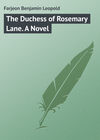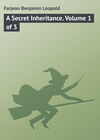Buch lesen: «Joshua Marvel», Seite 26
"I have no doubt, skipper," said Rough-and-Ready, smiling and pointing to Stephen Homebush, whose head was hanging over the bulwarks, as if its owner were curiously interested in the swelling of the waves, "that Mr. Homebush is quite ready to side with the men, and to declare that he is sea-sick because you set sail on a Friday."
Captain Liddle smiled at the pious sufferer, and shrugged his shoulders. It was evident, although he said nothing upon the subject, that he had already formed a not too favorable opinion of Stephen Homebush.
For the first three days the prognostications of the sailors, that "something" was sure to happen because the voyage was commenced upon a Friday, did not seem likely to be realized. The weather was fine, the wind was fair, and every stitch of canvas was set. But the grumbling did not cease, and for a very good reason. Scadbolt and the Lascar did their best to keep the subject warm, and between them managed to foment and increase the dissatisfaction. Captain Liddle, cognizant of this, became stern and strict, and took but little rest. He did not know who it was that was encouraging the men; he suspected Scadbolt, and, estimating his second mate at his proper worth, he wanted but the slightest confirmation of his suspicions to take prompt action against the offender. By this time the passengers had recovered from their sea-sickness, and begun to assemble on the deck. Stephen and Rachel Homebush set to work vigorously in their task of reclaiming the sinners, in which category every person but themselves on board was included; but though they prayed (for others), and groaned (for others), and "wrestled" (for others), their efforts were not crowned with success. Indeed, the only person who tolerated them at all was the man who had the worst character, and whom nearly everybody avoided. Rough-and-Ready was a treasure to the pious couple. To him, as the most illustrious sinner within their reach, they imparted the knowledge of their own goodness and of everybody else's wickedness; him they informed that their special mission (out of heaven) was to lead him to the waters of grace, and that his special mission was to be led thereto by them. They prayed for him wrathfully, in stony voices, and would have wept over him, had he allowed them to do so. And when they found that they made no impression upon him (for it was only his good-nature that induced him to listen to them), they groaned the louder, and prayed the longer, and wrestled the more, because of the hardness of man's heart. It was a curious thing, seeing how good they were and how bad he was, to observe the conduct of Little Emma, Mrs. Pigeon's five-year-old daughter, towards the saints and the sinner. The little child ran away from the saints, and cried and struggled when Rachel Homebush took her hand; but when she saw the sinner, she ran into his arms with perfect confidence, and submitted to be tossed in the air and to be kissed by him very much as if she liked it. But then children have no judgment.
Towards the close of the third day the weather became threatening, and the sails were taken in. This set the grumblers at work more busily than ever. Some time before midnight, the watch being in charge of the second mate, Captain Liddle came unaware upon two of the men who were grumbling, and sternly asked them what they were grumbling at. The Lascar was one of the twain, and of course he did not reply; but the other man, being pressed by the captain, pulled at his forelock, and said that the sailors weren't pleased because the voyage had been commenced on their unlucky day.
"And that's the cause of this rough weather, eh?" questioned Captain Liddle sarcastically.
"Yes, your honor," was the reply. "Why, even the second mate says so."
"Does he?" cried Captain Liddle, turning wrathfully upon Scadbolt, who at that moment approached them. "What do you mean, Mr. Scadbolt, by spreading dissatisfaction among the crew?"
Brought face to face with the man to whom he had spoken, Scadbolt, who was no coward, gave him a threatening look, and said, -
"Well, sir, I've an objection to setting sail on Friday; and, as you see, the men have the same objection."
"I see quite enough to warn you to be careful," said Captain Liddle in a determined tone; "I have warned you before, and I warn you now for the last time. Keep your objections to yourself, sir, and trouble yourself only with your duty. – And you, men, attend to yours, and let me hear no more of this nonsense. You know me well enough to know that I will not be trifled with."
The men slouched away, and Scadbolt was obliged to suppress his passion for the time: but it burned the fiercer for that.
The next day the weather became worse, and circumstances thus gave a color to the dissatisfaction, which grew stronger every hour. But the captain was equal to both emergencies; like a good sailor and a stout captain he grappled with the storm that raged without, and with that scarcely less dangerous one that raged within. He was seldom off the deck, and when he did go down to snatch an hour's rest, he left Joshua on board to watch in his place. For Captain Liddle was not slow to discover that Joshua was the man of all the other men on the ship upon whose faithfulness he could best depend. He said this many times to his wife, and often spoke to her in praise of Joshua. Minnie heard this, and heard also of the dissatisfaction among the sailors, and how Scadbolt, the second mate, had fomented the dissatisfaction. About this time a whisper spread among the passengers that there were three or four sailors in the crew who only wanted a favorable opportunity to break into open mutiny. Confirmation of this was given by the captain, on the third day of the bad weather, when the ship was scudding along under bare poles. He, coming down hastily into the saloon, went into his cabin, and made his appearance in a few minutes with a belt buckled round his waist and two pistols in it. The passengers, looking at each other in astonishment, received another shock presently by the surprising appearance of Rough-and-Ready. His dress hitherto had been of a respectable character black coat and waistcoat and tweed trousers; but now he had on a red-serge shirt, and a rough billycock-hat, and buckskin riding-trousers, and boots that reached half-way up his thighs, and a red-silk sash round his waist, with knife and pistol stuck therein. You may guess the alarm he caused among the ladies; the only passenger who seemed pleased at the change in his appearance was little Emma Pigeon, who skipped round him delightedly, and clapped her hands in approval of his bright-colored shirt and sash. Rough-and-Ready caught the child in his arms and gave her a hearty kiss, and nodded cordially to the fellow-passengers who had so studiously avoided him. They were so frightened at his desperate appearance, that they forgot to frown upon him as they were wont to do. Rough-and-Ready then going on deck, walked up to Captain Liddle, and said, -
"You can depend upon me, skipper. I've seen this sort of thing before."
Captain Liddle gave him a look of grateful acknowledgment, and they made their way into the midst of a knot of sailors who were standing irresolutely about Scadbolt and Joshua. Joshua was cool but perplexed, and Scadbolt was in a furious rage.
"Whose watch is this?" asked Captain Liddle. He knew well enough, but he had a motive for asking.
"Mine, sir," answered Joshua.
"What are the men hanging about for?"
"I gave an order, sir, and Mr. Scadbolt countermanded it."
"Give your order again, Mr. Marvel."
Joshua did so; and as Scadbolt, in a voice thick with passion, was desiring the men not to obey it, Captain Liddle very promptly knocked him down. Calling two of the sailors by name, Captain Liddle ordered them to put the second mate in irons. After the confusion which followed the execution of this order had partially subsided, Captain Liddle cried out, -
"Now, then, what have you to complain of? Speak out like men."
At this one of the sailors stepped forward, and said respectfully, -
"Well, your honor, some of us think it would have been better if we had stopped in port another day."
"That's a matter of opinion," said the captain. "You have a right to yours, but I have a right to mine also; and I am master of this ship. Now I ask you as sensible men and good sailors, is it right that you should forget your duty because we don't agree upon a certain point? Do you know what this means my men?" pointing to Scadbolt. "It means mutiny. What would any one of you do if you were skipper in my place You would put a stop to it at once, as I have done, and as I intend to do. I'll do it by reason, if you'll let me, and I'll say nothing of any other means, for I don't want to use them. I speak you fair, men, and I mean you fair. What do you say, now, to treating me as I treat you?"
Acquiescent murmurs ran round the crew, most of whom had gathered together during the scene. "And at such a time as this too," continued Captain Liddle, "though it would be all the same in fair weather or foul. I'll tell you something that many of you, as good mariners, suspect already. We are near a dangerous coast-how near I do not know, for I have not been able to take a sight for two days. And it's at such a time as this that this bad sailor-I found out before we got into the Bay of Biscay that he wasn't as good as he ought to be-it's at such a time as this that he tries to get you into trouble. Come, now, have I spoke you fair?"
"Yes, you have; spoke like a man!" a dozen voices said.
"That's well said. Whoever is on my side step over to me."
Every man-even the Lascar, too much of a coward to stand aloof-stepped to the captain's side and saluted him.
"I'm proud of my crew," was the captain's simple remark after this. "Now go to your duty."
As the captain walked on to the poop, Rough-and-Ready said,
"That was well done, skipper; but there are two or three black sheep among 'em, for all that."
"I know it," replied Captain Liddle, with a significant look. "I shall keep a sharp look-out on them. I've got a man on board that's a match for a dozen black sheep, or I'm very much mistaken."
Rough-and-Ready laughed and turned on his heel, and Captain Liddle went down to say an encouraging word to his wife.
On the eighth day the captain, suspecting that they were in the vicinity of the Minerva Shoal, near which there were some dangerous rocks, ordered a sharp lookout to be kept for broken water. All the passengers were by this time in a state of great alarm, and although Captain Liddle tried to cheer them by encouraging words, his anxious face belied his speech. Perhaps the one who suffered the most from terror was Stephen Homebush. His terror was so great that he forgot his mission, and flew to others for consolation, instead of imparting it. Such men as he are most true to their calling when the weather is fine. It was a miserably dark night. The captain, completely tired out, had gone down to his cabin for a little rest. All the passengers, with the exception of Rough-and-Ready, who never seemed to sleep, and yet was the freshest man of them all, had retired to their beds with hearts filled by gloomy forebodings of what the morrow might bring; and there they lay, tossing about, listening to the raging wind that was driving them perhaps to certain death. In the captain's cabin were Mrs. Liddle and her maid. There was something in the present danger that was to Minnie almost a relief from the horrible monotony of her life. Her self-imposed silence had become unbearable, and she fretted under it until her health was in danger of giving way. So that this change, with all its terrors and uncertainties, was an absolute relief to her. She was too sad and unhappy to be frightened at the prospect of death. Had the future held out to her any hope of happiness, she would have prayed to live; but as it was-"Better to die," she thought, "and so end all." There is no doubt that this miserable state of her mind was due to the want of proper moral training in her childhood. Thrown completely upon herself; with no mother's love to teach her what is often taught by love's instinct alone, that such and such impulses and thoughts are weeds that destroy, and such and such are flowers that beautify: doomed to the almost sole companionship of a father whose misfortunes had rendered him an unfit teacher, it is scarcely to be wondered at that she should have been oblivious of the true duty of life.
"Bessie," said Captain Liddle to his wife, "I have come down for an hour's sleep. I can rest with confidence, for Marvel is keeping the watch."
Mrs. Liddle nodded, and gave him a sweet little smile that was like wine to him; and Minnie heard him say, in answer to a whisper from his wife, "We are in God's hands, Bessie, and must trust to His mercy." "We are in God's hands, and must trust to His mercy," thought Minnie as she left the cabin; "and Joshua is keeping the watch. Death may be very near. Will it be wrong to speak to him?" Mechanically she made her way to the deck, stumbling two or three times and bruising herself. But she felt no pain. "I should like to die near him," she thought; "if he would take my hand in his, I should be content and happy."
Nothing but darkness surrounded her on deck. She clung to a rope, appalled by the mournfulness of the scene. Not a star was to be seen in the heavens, and the sky and water were as black as the night. So solemn, so mournful was every thing around, that the ship seemed to be rushing into a pit of death, where no light was. She could not see her hand before her, but all at once her heart beat wildly at the sound of Joshua's voice. He was speaking to Rough-and-Ready, and they were quite near her, although she had not seen them. Even now she could but barely discern their forms in the gloom. Joshua had just made a remark that Rough-and-Ready must have been a great traveller.
"Yes," answered Rough-and-Ready, "I've been about a pretty great deal. I've led a wild life; but then, you see, I never had any one to care for but myself."
"Never?" questioned Joshua, in a tone that had a dash of pity in it.
"Never but once, and that was only for a little while. But what matters? It will be all one by and by."
"I should be sorry to think you meant that," continued Joshua; "it would be a sad belief that, at such a time as this."
"You speak as if you didn't believe it, at all events," said Rough-and-Ready, in tones as soft as a girl's; "but then your circumstances are different to mine. You are young; I am" -
"Not old."
"Old enough for twice your years. Then you have friends at home, mayhap?"
"Ay, dear ones."
"Mother and father?"
"Ay; God bless them!"
"Wife perhaps?"
Joshua gave a gasp that sounded almost like a cry of pain.
"Ah, well," continued Rough-and-Ready, "if we were to go down this minute, I don't know the man or woman who would say 'Poor fellow!' when my fate was known. I leave no one behind me, and my death would bring no grief to a single soul. Perhaps my condition is the happier of the two."
"Not so," said Joshua sadly; "and I hope-indeed I believe-that you don't mean what you say. I have a friend at home-Dan, his name-to whom the news of my death would be the bitterest grief. I have dear ones at home, whose lives would be lives of mourning if I were not to return. I know this, and feel the pain that they would experience should it be God's will that we are not to escape this peril. But, strange as it may sound, I would not spare them the pain if it were in my power. Could I, by a wish, destroy the memories that make my life dear to me and them-dearer than you imagine-and so pluck from their hearts and minds the sting that my death would bring to them, I would not do so. For after death, there is life!"
"You believe in the immortality of the soul, mate?"
"Surely; and you?"
Rough-and-Ready made no reply.
"'Tis often difficult to believe in what we don't understand. On such a night as this-bleak, dreary, awfully solemn-with death waiting for us within a few yards perhaps-it is difficult to believe that there are spots on the earth where the sun is shining and where the flowers are blooming."
"That's true, mate; you speak more like a scholar than a sailor. Shake hands."
"I learned a great deal from the friend of whom I have spoken," said Joshua, grasping Rough-and-Ready's hand. "What is that ahead of us?"
A dark cloud. Impossible to see whether it belonged to earth, or air, or water. A moment after he uttered the words, the man who was keeping the look-out cried that there was land ahead. Joshua hastily gave some orders, and was making his way to the saloon to arouse the captain, when he was almost thrown off his legs by a terrible shock. Involuntarily he threw his arms around Minnie, who was clinging to the rope. She held him fast for a moment, and he cried, -
"Who is this?"
"It is me," she said; "cling to me."
"Don't stir," he whispered rapidly, filled with a wild amazement at the familiar tones of Minnie's voice; "if it were not that I know I am not dreaming, I could believe a spirit spoke, and not a woman. But keep you here; do not move for your life."
The next instant all was confusion, and cries and lamentations filled the air. Captain Liddle was on deck barefooted, and all the passengers were there in their nightdresses, clinging to ropes and spars, praying and crying and wringing their hands. Great seas washed over the ship, drowning the cries for a brief time; the night was so dark that their true situation could not be discovered, and imagination added to their terrors and magnified them. The captain could do literally nothing; for the ship appeared to have been lifted on to the rocks, and kept bumping against them in its endeavors to get free. And yet there was sea all around them. Some of the passengers had sought shelter under the lee of the cuddy, among them the captain's wife, Mr. and Mrs. Pigeon and Little Emma, and Steven and Rachel Homebush. Many times during the night was the voice of Stephen Homebush heard, calling upon the Lord to save him; while his sister Rachel, braver than he, stood by his side, with a stern set face, in silence. The cheery laugh of Mrs. Pigeon was stilled, but she was not so overcome by terror as not to be a comfort to her husband and child; during the dark night those three clung together and comforted each other as well as they were able; while the captain, making his way from one group to another, bade them not lose heart; for the ship seemed to be keeping together, and when daylight came their condition might be found to be less desperate than it appeared.
"Besides," he whispered to the male passengers, "we have three or four rascals among the sailors, and for the sake of the women we must keep ourselves cool and self-possessed."
To his wife he said simply, -
"Well, Bessie, this is a bad job. I ought not to have allowed you to come with me."
"I would sooner be here with you, John," she said, kissing him, "than I would be at home in safety."
"Brave little heart," he whispered to himself as he walked away from her. "Yet I could bear it better if I were alone."
James Heartsease and Harry Wall kept together, as friends should, all through the night. They felt not a particle of fear; they thought it was very grand and very awful, and spoke in calm tones of what the morrow might bring.
"Don't think we shall see China, Jim," said Harry.
"Perhaps not. Hope no body will be hurt," was the reply. "What a grand painting this would make!"
A few minutes after Joshua had left Minnie, he came to the cuddy, where Mrs. Liddle had sought protection.
"Mr. Marvel," she called to him, "have you seen my maid?"
Then it came upon him that the woman to whom he had clung when the ship struck was the gypsy-maid who had kept herself so reserved, and he said, "Yes my lady; do you want her?"
All the officers called the captain's wife "my lady," and she was proud of the title.
"Yes," she answered; "I wish you could bring her to me, poor girl; she is friendless and unhappy, poor child!"
"Has she no friends at home, my lady?" Joshua could not help asking.
"None, I believe."
The word "home" reached little Emma Pigeon's ears, and as she nestled in her mother's arms, the child cried, "Mother, are we going home?"
"Yes, yes, my dear," sobbed Mrs. Pigeon; "try to go to sleep, there's a darling." And she rocked the child, and sang a little song about birds and angels.
Joshua, steadying himself as he walked cautiously to where Minnie was standing, wondered to himself whether it was fancy that had made the gypsy-maid's voice sound so familiar to him; a sea washing over the deck, drenched him to the skin, and as he stood upright and shook the water from his clothes, the memories that were stirred within him brought to him a picture of the dear old kitchen at Stepney, with himself half-naked, barefooted, and with the water streaming from him, standing at the door. The vision may have occupied but a moment, but the picture was complete; father, mother, Ellen, Dan and the birds, the Old Sailor, all were there. But where was Minnie? Why, by his side, with short curly hair and brown gypsy-face. "Am I mad?" he exclaimed, as he dashed the waters from his eyes. But when he reached the spot where Minnie stood, and she clasped his hand and said, "Thank God, you are safe!" his amazement grew.
"I cannot see your face," he whispered, with his arm round her, for the better protection of both; "but your voice is strangely familiar to me. Do I know you?"
"Yes. But do not press me farther. Wait till the light comes. Shall we live till then?"
"I hope so."
"Will you promise me to keep near me till daylight comes? It is my dearest wish-my only one."
"I promise," he said, strangely agitated, "until my duty calls me away."
"And even then, you will come back when you have done your task, and stand by my side?"
"I will, my poor girl. I have come now to bring you to the captain's lady."
"She sent you for me?"
"Yes."
"She is a good lady. But wait a little; I have something to say first." Many moments passed before she spoke again, and in the pause a grateful prayer went up from the girl's heart even for the small blessing of gentle speech from her hero's lips. "You have made me very, very happy. Until tonight-for many, many months past-I have been most unhappy." She bent her lips to his hand and kissed it. "Now answer me. We are in great peril?"
"The greatest, I fear."
"But a danger threatens you of which you are not aware. Listen. The second mate, he who was put in irons the other day" -
"Scadbolt-go on."
"Is loosed."
"By whom?"
"I don't know. But he is loosed, and but five minutes since was near me with a sailor whom I think I know, although I could not see him. Listen. I must whisper, for he may be near us now. They were talking of you, and they swore-O my God! – they swore to have your life."
"They spoke of me by name?"
"By name-Joshua Marvel."
"You think you know the sailor who was talking to Scadbolt. Is he a dark man?"
"Yes; a Lascar I think."
"You are right. He owes me an old grudge."
"Scadbolt said that this coast is one of the most dangerous upon which a ship could strike. He believes he knows pretty well where we are, and that it will be a fight for the boats" -
"We have only two, the jolly-boat and the longboat; he may be right."
"Be on your guard; tell the captain; be prepared."
"We will; and you" -
"I can protect myself. Feel this."
"A knife!"
"I picked it up. Let them beware."
Another lurch of the vessel made them cling closer to each other. During all the horror of the scene, Joshua had not dared to ask whether it really was Minnie to whom he was speaking; he feared to know the truth. Minnie on the ship with him! and Ellen at home-and Dan-he dared not think of it.
"Come," he said; "I will take you to the captain's lady. Cling fast to me."
"Say a few words to me."
"What are they?"
"God bless and forgive you."
"God bless and forgive you! From my heart."
"He will, I think," said the girl, as if communing with herself. "I have not felt so happy for a long time past. Death has no terror for me if you are kind!"




















